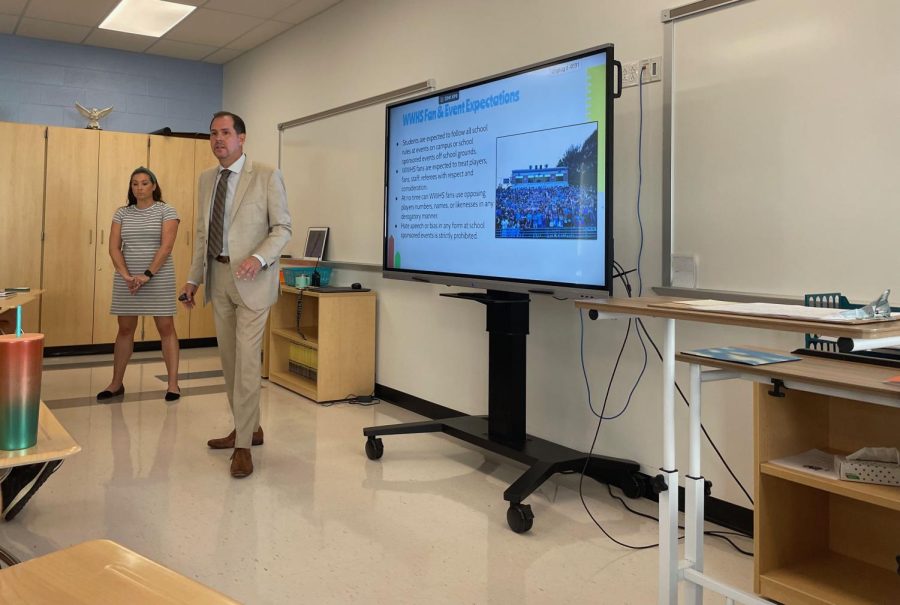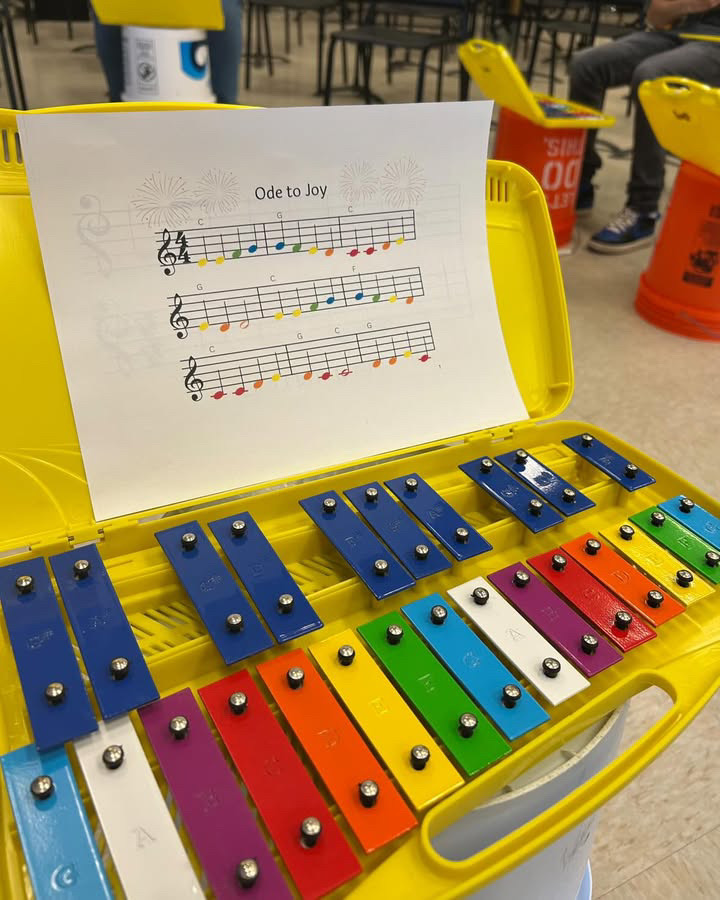Administrators visit math classes to discuss new school policies, expectations
The town hall-style presentations covered the shift to a one-lunch bell schedule, the return to pre-COVID attendance policies, new cell phone use guidelines and ID requirements for seniors leaving campus during lunch.
September 6, 2022
Administrators and counselors visited math classes last week to discuss new schoolwide policies and expectations for the 2022-2023 school year. The town hall-style presentations covered the shift to a one-lunch bell schedule, the return to pre-COVID attendance policies, new cell phone use guidelines and ID requirements for seniors leaving campus during lunch.
The changes reflect updates to MCPS’ Student Code of Conduct and systemwide regulations this summer. The school district’s new cell phone policy prohibits students from using cell phones during classroom instruction unless a teacher makes an exception for educational purposes, while the attendance policy resumes enforcement of pre-pandemic rules that place limits on unexcused absences before students risk losing course credit.
During the town halls, administrators also provided students with additional details about Whitman’s new lunch schedule, which consists of a singular lunch for all students during sixth period. Under the updated bell schedule, students may meet with teachers and counselors during the second half of lunch, administrators explained.
In math classes last week, administrators discussed these policies with students and answer questions about their implementation. Principal Robert Dodd and 12th Grade Administrator Kristi McAleese visited math classes due to the loss of instructional time in English classes for presentations in previous years, McAleese said.
“We wanted to ensure that all students heard our message and understood our expectations,” McAleese said. “We want to make sure that we are all starting the school year on a positive note.”
McAleese and Dodd also announced updates to the school’s long standing open lunch policy, which exclusively permits seniors to leave campus during lunch. The administrators informed students that they must now display their student IDs to security officers in order to leave campus during the 55-minute period.
School officials also announced that Whitman is also returning to pre-pandemic attendance standards that put students at risk of losing course credit after five unexcused absences, and equates three unexcused tardies with one unexcused absence. As part of these renewed enforcement efforts, Dodd and McAleese informed students that all entrances other than the school’s main office doors will close at 7:40 a.m. to ensure students arrive to class earlier and check in at the front office if they are late to school.
The changes come as the school district announces a goal to reduce absenteeism among MCPS students by 25%, according to a Mental Health and Wellbeing Updates report that officials are set to present at a Board of Education meeting on Thursday. During the 2021-2022 school year, 29.3% of MCPS high school students were “chronically absent,” missing more than 10% of the school days they were enrolled for, according to the report.
MCPS’ new guidelines also include updated rules that govern the use of cellphones in schools. The regulations prohibit students from using cell phones for non-instructional purposes, with the exceptions of lunch and transition periods. During the town halls, Dodd and McAleese informed students that teachers may require students to place their cell phones in hanging shoe holders or store them in their bags for the entire class period. They also warned students that they may face disciplinary action if they violate the new phone regulations.
“The new Whitman regulations are definitely a step-up from last year’s,” junior Andrea Ellers-Ruiz said. “The new phone policy is what was the most surprising for me and others. The shoe holder policy that some teachers will be using seems a bit extreme in my opinion. Not every student is constantly on their phone so I think it’s unfair to them.”
As students begin a new school year, administrators hosted the town halls to provide students with clarity and answer questions regarding new school policies, McAleese said. They also aimed to connect with students in the classroom, she added.
“We thought it was really important to have a more intimate setting with the students,” McAleese said. “It’s always good for administrators to get back in front of the students again.”











Alex Schupak • Sep 7, 2022 at 11:04 am
This is literally 1986